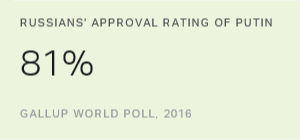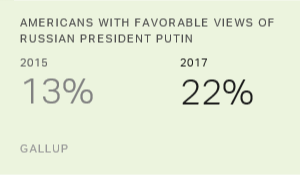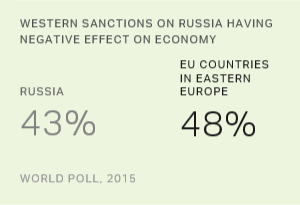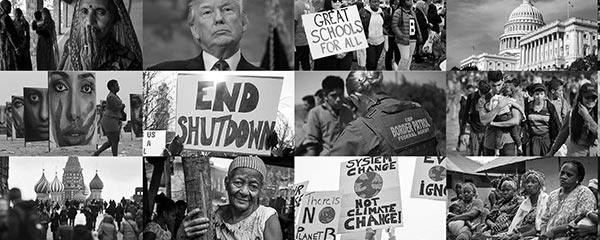Story Highlights
- Putin's approval ratings stable, higher than 80%
- Economic outlook worst since global economic crisis
- Three in four Russians see widespread corruption in government
WASHINGTON, D.C. -- Tens of thousands of Russians turned out to protest against government corruption last weekend, but since 2014, neither corruption -- nor a failing economy -- has hurt Russians' approval ratings of President Vladimir Putin. Russians' approval of their president remains undiminished from the high ratings they have given him since Russia's annexation of Crimea three years ago. More than eight in 10 Russians (81%) in 2016, Gallup's most recent year of polling in the country, said they approved of the job Putin is doing.
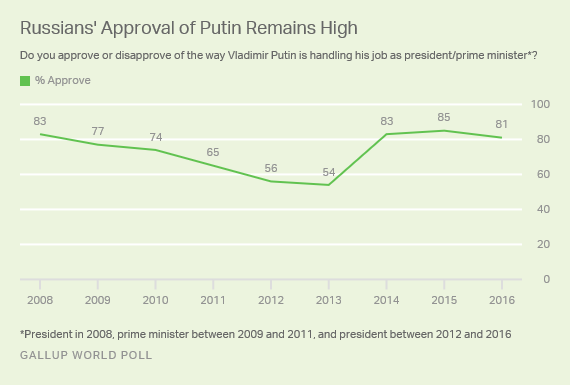
Putin's unfaltering popularity has been remarkable because it appears to be untied to his country's recent economic troubles. Russians' approval of Putin has remained buoyant -- even ticking slightly upward -- amid plunging oil prices, years of recession and Western sanctions over Moscow's actions in Ukraine.
While Russians have not soured on Putin, they have on their economy. After a short-lived rally in 2014, Russians' optimism about the outlook for their national and local economies has continued to wane, dropping to levels in 2016 that rivaled the recent lows in 2009 at the height of the global economic crisis. Just 14% of Russians in 2016 said their national economy was getting better, and 18% said this about their local economies.
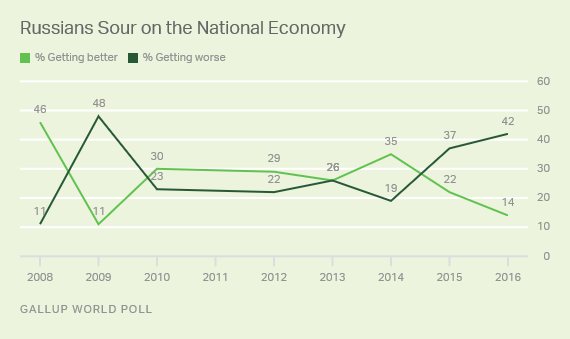
As further evidence that Putin's popularity in recent years has been mostly immune to the changing economic conditions, even though the percentage of Russians who say economic conditions are getting worse has more than doubled since 2014, Putin's ratings among this group of pessimists have actually increased. Nearly seven in 10 Russians (68%) who saw their economy as getting worse in 2016 approve of Putin. Just the year before the annexation of Crimea, 29% who saw the economy as getting worse approved of the president.
At the same time, Russians' outlooks on their own lives have not retreated as much as might be expected given the economic climate. However, the 29% of Russians who rate their lives positively enough to be considered "thriving" is still down from the record-high 34% in 2014 -- and this indicator may prove to be the one to watch ahead of the election. As thriving percentages declined after the global economic crisis, Putin's approval ratings also edged lower. This trend ended abruptly in 2014, when thriving increased almost 10 percentage points in one year after the Sochi Olympics and the situation in Crimea.
Widespread Corruption Does Not Taint Putin's Approval
In the last 10 years that Putin has been in power as either president or prime minister, large majorities of Russians -- upward of seven in 10 -- have perceived corruption as widespread in their government. In fact, it was this perceived corruption that drew protesters to the streets in Moscow and other Russian cities, resulting in hundreds of arrests and the detention of opposition figure Alexei Navalny. Protesters have directed most of their ire at Prime Minister Dmitry Medvedev, rather than the president.
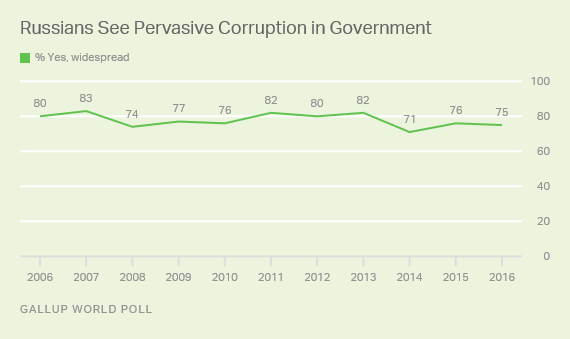
However, this perceived endemic corruption does not appear to be harming Putin's most recent approval ratings. Since 2015, Putin's approval ratings among Russians who see corruption as widespread in government have been just as high as ratings among Russians who do not see it as widespread. Before 2015, Russians who saw widespread corruption tended to give lower approval ratings to Putin. But even among this group, his ratings have never dropped below 50%.
Implications
The rally effect that propelled Putin's approval ratings upward in 2014 -- and colored other aspects of Russians' lives -- is not unique to Russia. After the Sept. 11 terrorist attacks in 2001, country unity and faith in a strong leader vaulted U.S. President George W. Bush's approval ratings to a record 90% and increased Americans' confidence in their institutions.
But Bush's ratings were not as buoyant and eventually succumbed to an increasingly unpopular war and the Great Recession. This has not happened yet in Russia. Even as they saw their economy slipping farther behind the rest of the world in 2016, Russians have continued to rally around Putin and his efforts to restore his country's status as a great power. This may be because many Russians overwhelmingly supported Crimea joining Russia -- which ultimately led to the economic sanctions against their country -- and are more likely to blame those who impose the sanctions rather than their president. With Russia's presidential election less than a year away, based on Putin's approval ratings, his odds of winning remain good -- should he decide to run again.
Gabriela Atanasiu and Art Swift contributed to this report.
The data in this article are available in Gallup Analytics.
Survey Methods
Results are based on face-to-face interviews with 2,000 adults in Russia, aged 15 and older, conducted from April to June 2016. For results based on the total sample of national adults, the margin of sampling error is ±2.7 percentage points. The margin of error reflects the influence of data weighting. In addition to sampling error, question wording and practical difficulties in conducting surveys can introduce error or bias into the findings of public opinion polls.
The Chechen Republic, Republic of Ingushetia, Republic of Dagestan and the Republic of Crimea were excluded due to political instability. The Republic of Adygeya, Republic of Kabardino-Balkaria, Republic of Karachaevo-Cherkessie and North Ossetia were excluded due to high crime levels. Remote small settlements in far-Eastern Siberia were also excluded. The excluded areas represent about 6% of the population.
For complete methodology and specific survey dates, please review Gallup's Country Data Set details.
Learn more about how the Gallup World Poll works.
